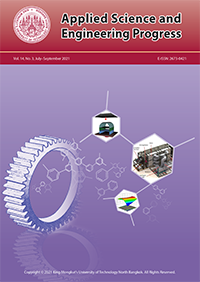Designing of Double Acceptance Sampling Plan for Zero-inflated and Over-dispersed Data Using Multi-objective Optimization
Main Article Content
Abstract
The double acceptance sampling plan (DSP) is wildly used tools for the decision of production quality control. In actually, most production processes have excellent quality control and well inspected, the number of defective items for many samples will be zero. For this reason, the traditional probability distribution is not appropriate for the DSP. This research proposed the DSP for the manufacturing that was affected by zero-inflated and over-dispersed count data. The number of defects for a sample inspection is considered under the zero-inflated Negative Binomial (ZINB) distribution. The required sample sizes (n1, n2) are designed to achieve the optimal plan parameter of (n1, n2, c1, c2)* the DSP under the ZINB distribution (DSPZINB). The Genetic Algorithm with multi-objective optimization is used to estimate the optimal plan parameters which are maximizing the probability of accepting a lot (Pa) and minimizing the total cost of inspection (TC) and the average number of samples (ASN) simultaneously. The sensitivity analysis of the required sample size is used to analyze the performance of the proposed DSPZINB which is presented through three numerical examples. The results showed that a smaller of required sample sizes and n1 < n2 are provide the optimal plan parameters to achieve the minimum and maximum value of the multi-objective function. Moreover, the proposed DSPZINB give a good performance when a shape parameter of ZINB distribution (k) is small and approaches zeros while a zero-inflation parameter (ϕ) is a large value.
Article Details
References
[2] M. Amitava, Fundamentals of Quality Control and Improvement. 4th ed., New Jersey: John Wiley & Sons, 2016, pp. 509–516.
[3] B. P. M. Duarte and P. M. Saraiva, “An optimizationbased approach for designing attribute acceptance sampling plans,” International Journal of Quality & Reliability Management, vol. 25, pp. 824–841, 2008.
[4] I. Kaya, “A genetic algorithm approach to determine the sample size for attribute control charts,” Inform Sciences, vol. 179, pp. 1552–1566, 2009.
[5] A. Kobilinsky and Y. Bertheau, “Minimum cost acceptance sampling plans for grain control, with application to GMO detection,” Chemometrics and Intelligent Laboratory Systems, vol. 75, no. 2, pp. 189–200, 2005.
[6] T. M. Cheng and Y. L. Chen, “A GA mechanism for optimizing the design of attribute-doublesampling- plan,” Automation in Construction, vol.16, no. 3, pp. 345–353, 2006.
[7] S. Sampath and S. P. Deepa, “Determination of optimal double sampling plan using genetic algorithm,” Pakistan Journal of Statistics and Operation Research, vol. 8, no. 2, pp.195–203, 2012.
[8] O. J. Braimah, Y. K. Saheed, R.O. Owonipa, and I.O.Adegbite, “Economic reliability acceptance sampling plan design with zero acceptance,” African Journal of Computing & ICT, vol. 8, no. 3, pp. 69–84, 2015.
[9] L. F. Hsu and J. T. Hsu, “Economic design of acceptance sampling plans in a two-stage supply chain,” Advances in Decision Sciences, vol. 2012, pp. 1–14, 2012.
[10] M. S. FallahNezhad and M. Aslam, “A new economical design of acceptance sampling models using Bayesian inference,” Accreditation and Quality Assurance, vol.18, no. 3, pp. 187–195, 2013.
[11] M. S. FallahNezhad and E. Qazvini, “A new economical scheme of acceptance sampling plan in a two-stage approach based on the maxima nomination sampling technique,” Transactions of the Institute of Measurement and Control, vol. 39, pp. 1097–1103, 2017.
[12] M. S. Fallahnezhad, E. Qazvini, and M. Abessi, “Designing an economical acceptance sampling plan in the presence of inspection errors based on maxima nomination sampling method,” Scientia Iranica, vol. 25, no. 3, pp. 1701–1711, 2018.
[13] A. Loganathan and K. Shalini, “Determination of single sampling plans by attributes under the conditions of zero-inflated Poisson distribution,” Communication in Statistics-Simulation and Computation, vol. 43, pp. 538–548, 2014.
[14] G. Uma and K. Ramya, “Determination of quick switching system by attributes under the conditions of zero-inflated Poisson distribution,” International Journal of Statistics and Systems, vol. 11, pp. 157– 165, 2016.
[15] G. S. Rao and M. Aslam, “Resubmitted lots with single sampling plans by attributes under the conditions of zero-inflated Poisson distribution,” Communication in Statistics-Simulation and Computation, vol. 46, pp. 1814–1824, 2017.
[16] F. K. Wang and S. S. Hailemariam, “Sampling plans for the zero-inflated Poisson distribution in the food industry,” Food Control, vol. 85, pp. 359–368, 2018.
[17] M. Ridout, J. Hinde, and C. G. DemeAtrio, “A score test for testing a zero-inflated Poisson regression model against zero-inflated negative binomial alternatives,” Biometrics, vol. 57, no. 1, pp. 219–223, 2001.
[18] R. Fang, “Zero-inflated negative binomial (ZINB) regression model for over-dispersed count data with excess zeros and repeated measures, an application to human microbiota sequence data,” M.S. thesis, Faculty of the Graduate School, University of Colorado in partial fulfillment, 2013.
[19] M. Arianna, G. B. Ursula, and B. Francis, “Effectiveness of sampling plans by attributes based on mixture distributions characterising microbial clustering in food,” Food Control, vol. 34, no. 1, pp. 50–60, 2013.
[20] F. K. Wang and S. S. Hailemariam, “Sampling plans for the zero-inflated negative binomial distribution in the food industry,” Quality and Reliability Engineering, vol. 34, pp. 1174–1184, 2018.
[21] The Math WorksTM, 9.7.0 (R2019b), License Number 40791029.


